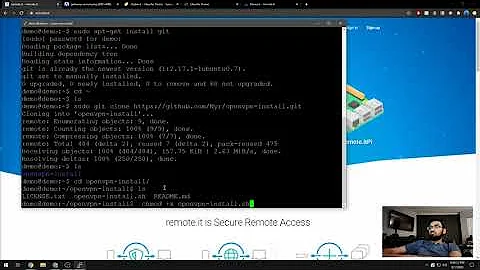Prevent SSH connection lost after logging into VPN on server machine
Solution 1
Let's consider following scenario:
- your VPS has a single ethernet interface, configured with IP address 4.3.2.1/24;
- your VPS can access the Internet via a default-gateway 4.3.2.254
- your VPS has not yet activated any OpenVPN connection; hence there are no tun interface active
In such a scenario, from your machine (let's suppose your machine is 9.8.7.6/24 with def-gw 9.8.7.254) you can successfully establish an SSH connection to 4.3.2.1. Hence both hosts 4.3.2.1 and 9.8.7.6 can succesfully reach each other.
Now, with such an SSH connection established, let's suppose:
- you launch an OpenVPN connection from your VPS 4.3.2.1;
- as such, a new tun0 interface will be dinamically configured (let's suppose it will be assigned a 10.10.10.2 IP, with a 10.10.10.1 PTP).
At this stage:
IF no route will be pushed from remote OpenVPN server to your local VPS, then nothing will change in term of routing, and your SSH connection will survive with no problems at all. In this case, the only traffic traversing the VPN is the one directed towards the remote OpenVPN Server (10.10.10.1);
IF remote OpenVPN server will push back some route, and expecially if VPS default-gateway will be replaced with 10.10.10.1 (remote OpenVPN endpoint), THEN you're having problems. In this case you're tunneling ALL the outgoing IP traffic (with the exception of OpenVPN itself) within the VPN.
In this second case (replacing def-gw right after establishing VPN connection), your previous SSH connection will "hang", due to asymmetric routing:
- Traffic from your machine (9.8.7.6) to VPS (4.3.2.1) will flow trough the previous, never changed, path;
- Traffic from VPS (4.3.2.1) to your machine (9.8.7.6):
- without the VPN (hence, initially) was routed through the 4.3.2.254 gateway;
- after the establishment of the VPN link, with related def-gw replacement, is routed through the VPN (10.10.10.1).
In other words: as soon as the VPN link is established, your return route from VPS to your machine is going to change and... this is not a good thing (several network devices, along the return-path, might recognize such asymmetric path and simply drop packets).
Furthermore, chances are high that your remote OpenVPN server is acting as a NAT-box: all the traffic coming from the VPN will be NATted with the public IP-Address of the remote OpenVPN Server. If this is true, than things are no more... "not good", but definitely "bad", as for your SSH connection: return traffic, in addition to get back along a different route, is coming back to your machine with a different source IP (the one of the public interface of the VPN server).
How to solve this problem?
Quite easily, indeed.
Simply instructing your VPS server to not route traffic to your machine along the VPN, but, instead, relying on previous route. It should be as easy as adding, before starting OpenVPN:
route add -host 9.8.7.6 gw 4.3.2.254
where:
- 9.8.7.6 is your machine public IP address
- 4.3.2.254 is the original default gateway of your VPS.
P.S.: by providing a much more detailed question, you would have gotten a much quicker answer :-)
Solution 2
You need to add route-nopull option (and remove redirect-gateway if it exists) to your OpenVPN client's configuration file on your VPS.
That way connecting to a VPN server won't modify any routes on your VPS, so you would be able to set those you need by yourself.
Related videos on Youtube
mic22
Updated on September 18, 2022Comments
-
 mic22 almost 2 years
mic22 almost 2 yearsI encountered an issue that I can't deal with. When I'm logged onto an VPS over SSH and try to estabilish VPN connection on that VPS, the SSH connection between VPS and my machine get lost. I assume that's because routing got changed by VPN settings. How to prevent that?
-
Nikolaidis Fotis over 9 yearsWhat about connecting to SSH after VP establishment ? :p You are right that this is caused because VPN overwrites the routing paths. What you can do is to keep your original paths untouched and just add the extra VPN path (Unless you want to use your VPS as proxy. That's another story). Which client do you use ?
-
 Damiano Verzulli over 9 yearsWhat do you mean with "try to establish VPN connection on that VPS"? You're connecting from your machine to an Openvpn server on the VPS? Your VPS is connecting to an Openvpn server running on a third host? In this last case, such VPN connection is pushing back some routes? Also, please confirm there are no NAT translations to reach your VPS (the IP address configured on its interface is the same you're specifying in the SSH connection?
Damiano Verzulli over 9 yearsWhat do you mean with "try to establish VPN connection on that VPS"? You're connecting from your machine to an Openvpn server on the VPS? Your VPS is connecting to an Openvpn server running on a third host? In this last case, such VPN connection is pushing back some routes? Also, please confirm there are no NAT translations to reach your VPS (the IP address configured on its interface is the same you're specifying in the SSH connection? -
 mic22 over 9 years@NikolaidisFotis I'm not able to connect since VPN is running. I use openvpn client. There's an
mic22 over 9 years@NikolaidisFotis I'm not able to connect since VPN is running. I use openvpn client. There's an--route-noexecoption to ignore routes pushed by the server but, as you mentioned, it doesn't help when I want to use VPN as proxy... -
 mic22 over 9 years@DamianoVerzulli the second option, yes routes are pushed (but I think it has to be done since I need that VPN to act like proxy to cloack original IP address of the machine), and no there's no NAT
mic22 over 9 years@DamianoVerzulli the second option, yes routes are pushed (but I think it has to be done since I need that VPN to act like proxy to cloack original IP address of the machine), and no there's no NAT
-
-
 mic22 over 9 yearsThank you for your answer @DamianoVerzulli! Default gateway is unspecified.
mic22 over 9 yearsThank you for your answer @DamianoVerzulli! Default gateway is unspecified.route addcommand with such 0.0.0.0 gw returnsSIOCADDRT: Invalid argument -
 mic22 over 9 yearsThat's what I get just after openvpn connects
mic22 over 9 yearsThat's what I get just after openvpn connects[server] Peer Connection Initiated with [AF_INET]64.251.27.139:443; TUN/TAP device tun0 opened; do_ifconfig, tt->ipv6=0, tt->did_ifconfig_ipv6_setup=0; /sbin/ip link set dev tun0 up mtu 1500; /sbin/ip addr add dev tun0 10.200.1.251/22 broadcast 10.200.3.255; ERROR: Linux route add command failed: external program exited with error status: 2 -
 Damiano Verzulli over 9 years@mic22 : I wonder how def-gw of your VPS can be unspecified as in this case such VPS cannot reach anything outside of the local subnet (and this means that both your machine --being able to connect via SSH-- and OpenVpn server --being able to establish VPN-- should be "local" and, as such, quite useless!). BTW: when you're connected via SSH you can easily get def-gw with a "netstat -rn" (line starting with 0.0.0.0, second column)
Damiano Verzulli over 9 years@mic22 : I wonder how def-gw of your VPS can be unspecified as in this case such VPS cannot reach anything outside of the local subnet (and this means that both your machine --being able to connect via SSH-- and OpenVpn server --being able to establish VPN-- should be "local" and, as such, quite useless!). BTW: when you're connected via SSH you can easily get def-gw with a "netstat -rn" (line starting with 0.0.0.0, second column) -
 mic22 over 9 years
mic22 over 9 yearsnetstat -rnresult0.0.0.0 0.0.0.0 0.0.0.0 U 0 0 0 venet0the VPS I'm using is an OVH basic option with Ubuntu 14.04 Server on board -
 mic22 over 9 years
mic22 over 9 years -
 Damiano Verzulli over 9 yearsOk. This sounds a strictly OpenVZ-related networking configuration that I'm not confortable with :-( So your VPS doesn't have a "strict" def-gw. Instead it simply send out everything on the lan virtual interface (venet0). So let's try to do the same, after establishing the VPN, with your client-machine IP: let's tell the VPS to send out trough the venet0 interface all the traffic directed to you. Something like: "ip route add a.b.c.d/32 dev venet0" where a.b.c.d is your client-machine public IP address.
Damiano Verzulli over 9 yearsOk. This sounds a strictly OpenVZ-related networking configuration that I'm not confortable with :-( So your VPS doesn't have a "strict" def-gw. Instead it simply send out everything on the lan virtual interface (venet0). So let's try to do the same, after establishing the VPN, with your client-machine IP: let's tell the VPS to send out trough the venet0 interface all the traffic directed to you. Something like: "ip route add a.b.c.d/32 dev venet0" where a.b.c.d is your client-machine public IP address. -
J. Singh over 8 yearsThis is confusing, and the language appears to have it backwards. Wouldn't you want to add a route with the SSH target's IP address and the local workstation's default gateway?
-
Ali.MD over 7 yearsnot work for me, ssh freezed after vpn connected
-
 The Onin about 7 yearsHey, thanks for this advice, but now I cannot reach internet through the tun0. I suppose I'm missing a gateway. Any ideas how to add a gateway for tun0? Relevant part of ifconfig:
The Onin about 7 yearsHey, thanks for this advice, but now I cannot reach internet through the tun0. I suppose I'm missing a gateway. Any ideas how to add a gateway for tun0? Relevant part of ifconfig:inet addr:10.56.10.6 P-t-P:10.56.10.5 Mask:255.255.255.255 -
Anubioz about 7 yearsYou need to manually add a route to the VPN server itself via your default ISP gateway, then add default gateway via 10.56.10.5 for all other traffic
-
 The Onin about 7 yearsI'm sorry, what? I have no idea what you just said. Could you give an example ?
The Onin about 7 yearsI'm sorry, what? I have no idea what you just said. Could you give an example ? -
 The Onin about 7 yearsLet me just clarify - I don't want to the default route to be via tun0, but I do need tun0 to have internet access.
The Onin about 7 yearsLet me just clarify - I don't want to the default route to be via tun0, but I do need tun0 to have internet access. -
Anubioz about 7 years@Housemd hm you need to have internet access through tun0 yourself or you need clients connected via tun0 from other places to have internet access?
-
 The Onin about 7 yearsI need access on tun0 myself, so i can use it with curl.
The Onin about 7 yearsI need access on tun0 myself, so i can use it with curl. -
Anubioz about 7 years@Housemd So basically you want a single program to be able use another interface, while the rest of the system use a standard interface for making connections? Have a look at this superuser.com/questions/271915/…
-
dusan over 5 yearsYou can add this line:
route The.IP.To.Go 255.255.255.255in the OpenVPN's configuration file if you only need to route a specific IP through the VPN connection, also with theroute-nopulloption mentioned in the answer. Source: superuser.com/a/628488








